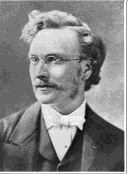Philip H. Wicksteed, 1844-1927
Es un economista británico. Fue durante algunos años pastor de la Iglesia Unitaria y escribió sobre literatura, teología y filosofía. Analizó y divulgó la obra de Comte, Santo Tomás de Aquino, Aristóteles, Ibsen, y muchos otros. Su pertenencia a la Sociedad Fabiana despertó su interés por la economía. Recibió la influencia de Jevons y de la Escuela Austriaca. Escribió sobre la teoría de la elección económica y de la asignación de recursos escasos. Su contribución más famosa es el uso del teorema de Euler para proponer que la distribución según el principio de la productividad marginal agotaba el producto total. Se considera que fue él quien alejó a los fabianos del marxismo.

Para Wicksteed no hay diferencia entre los aspectos económicos de la vida humana y los "otros" aspectos. Invitó a los economistas a que tuvieran una visión amplia de su campo de estudio, permitiendo y compatibilizando los sentimientos humanitarios, la mirada crítica y el sentido común.
Obras
- Dante: Six sermons, 1879.
- "Progress and Poverty", 1882, The Inquirer
- "Mr. Toynbee’s Lecture on "Progress and Poverty"", 1883, The Inquirer
- "The Marxian Theory of Value. Das Kapital: a criticism", 1884, Today
- "The Jevonian criticism of Marx: a rejoinder", 1885, Today
- Our Prayers and our Politics, 1885
- The Alphabet of Economic Science , 1888.
- "On Certain Passages in Jevons's Theory of Political Economy", 1889, QJE
- "Fabian Essays in Socialism", 1890, The Inquirer
- An Essay of the Co-ordination of the Laws of Distribution, 1894.
- Contributions to R.I. Palgrave, editor, Dictionary of Political Economy, 1894-99:
- "Degree of Utility"
- "Dimensions of Economic Quantities"
- "Final Degree of Utility"
- "Political Economy and Psychology"
- Getting and Spending: papers on the meaning and uses of money, 1897
- Studies in Theology with J.E. Carpenter, 1903.
- "Review of H.S. Jevons, Essays on Economics", 1905, EJ.
- "Review of Pareto, Manuale di economica politica", 1906, EJ
- "Social Ideals and Economic Doctrines of Socialism", 1908, Inquirer
- The Common Sense of Political Economy: including a study of the human basis of economic law, 1910.
- Dante and Aquinas, 1913
- "The Distinction between Earnings and Income, and between a minimum wage and a decent maintenance: a challenge", 1913, in Temple, editor, Industrial Unrest and the Living Wage
- "Political economy", 1913, EJ
- "The Scope and Method of Political Economy", 1914, EJ .
- "The Economics of Enterprise", 1914, EJ
- The Reactions between Dogma and Philosophy: illustrated from the works of S. Thomas Aquinas, 1920.
No hay comentarios.:
Publicar un comentario